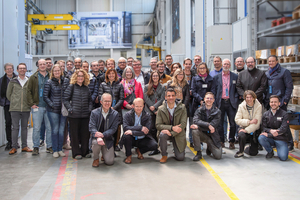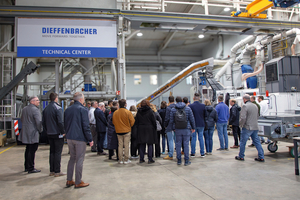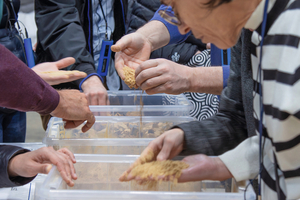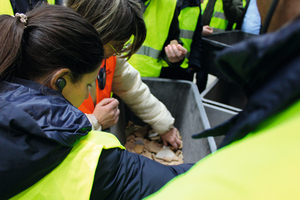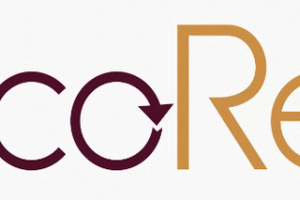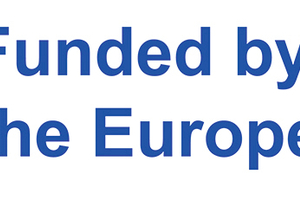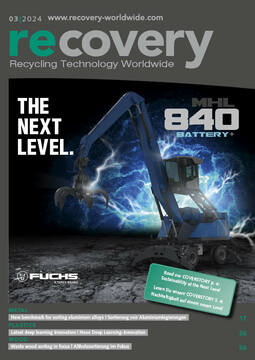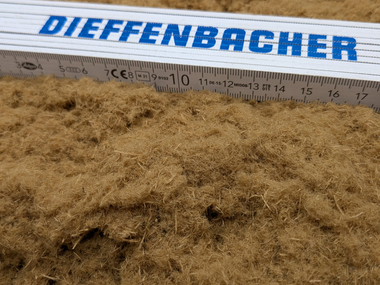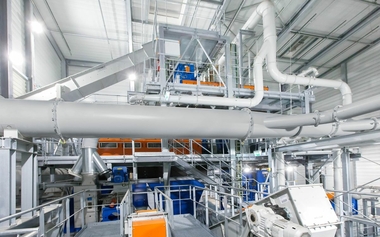Demonstration event at DIEFFENBACHER in Eppingen and at DIEFFENBACHER partner TOMRA in Mülheim-Kärlich
In May 2022, DIEFFENBACHER and 19 organizations from seven countries joined forces in the EcoReFibre (“Ecological solutions for recovery of secondary materials from post-consumer fibreboards”) research project, which has € 12 million in funding from the European Union. The project aims to recycle fiberboards at the end of their life cycle and use the recycled wood fibers to produce new fiberboard.
After almost two years of intensive research, the consortium met at DIEFFENBACHER in Eppingen/Germany and then at TOMRA in Mülheim-Kärlich/Germany on April 23 and 24, 2024. The purpose of the on-site meetings was to demonstrate and discuss important interim results of the research project. After a welcome from DIEFFENBACHER CEO Christian Dieffenbacher, the first day’s 40 or so participants toured the factory at the company’s headquarters in Eppingen. The tour ended in the DIEFFENBACHER Technical Center, the company’s newly modernized and expanded in-house test laboratory and research center.
“We’ve added a second steel construction level to our Technical Center, creating 10 % more space. Control cabinets and auxiliary equipment now sit here without disturbing the testing processes on the machines,” reports Axel Ganster, Team Leader Wood Technology at DIEFFENBACHER. “Along with modernizing the existing machines such as the ClassiSizer, oscillating screen and exhaust system, we’ve added a single-shaft shredder, a roller screen, mobile conveyor technology and a central data collection system. Overall, our Technical Center now offers more testing options with a wide range of materials,” he adds.
Recovery of fiberboards
Fiberboard recycling was next on the agenda. During the demonstration, fiberboard material was shredded to chip size in the single-shaft shredder designed by DIEFFENBACHER. The chips were then fed into a DIEFFENBACHER ClassiSizer. “The ClassiSizer reduces the fiberboard material to the desired particle size,” explains Jean-Christophe Zimmermann, Head of Sales of DIEFFENBACHER’s Recycling Business Unit. “The material is resized by the high kinetic energy of the installed impact rotor and by the interaction of the individual particles with each other. After final screening on a DIEFFENBACHER oscillating screen, the fines produced can be used for the surface layer in particleboard production,” Zimmermann continues.
The second part of the demonstration at DIEFFENBACHER was dedicated to fiberboard-to-fiberboard recycling, i.e., the production of new fiberboard from recycled fiberboard material. Using a DIEFFENBACHER ClassiScreen, the waste wood provided by EcoReFibre project partner Veolia was separated into fines, chip-size and oversized fractions. In the same step, films, textiles and other lightweight materials such as paper were removed from the waste wood. “In a real-life application in a recycling plant, the oversized material would be reshredded and fed back into the process. The fines would be cleaned and used for particleboard production,” explains DIEFFENBACHER Technologist Jonas Réssy. “The chip-size material from the demonstration was made available to our partner TOMRA for the next day’s demonstration,” he says.
After the one-day visit to DIEFFENBACHER, the project members traveled to TOMRA Recycling‘s headquarters in Mülheim-Kärlich, to witness the cutting-edge waste wood sorting technology offered by the leading provider of sensor-based sorting solutions. Although TOMRA is not an official member of the EcoReFibre consortium, the company was invited by its partner DIEFFENBACHER to carry out exclusive machine demonstrations for the EcoReFibre members, reinforcing the practical application of the research results in sensor-based sorting.
Jose Matas, Director of the Wood Segment at TOMRA Recycling, said at the event: „TOMRA was the first to introduce deep learning sorting technology for waste wood recycling to the market. We are pleased that with our innovations we can not only contribute to the positive results of the EcoReFibre project but also advance the use of high-quality recycled wood fibers.“
Intelligent sorting using X-ray transmission and deep learning technology
There were three different live demonstrations on two sorting systems: The first test focused on TOMRA‘s X-TRACT™. Thanks to its powerful X-ray transmission (XRT) technology, X-TRACT™ recovers waste wood from complex mixed streams. The sorting system detects contaminants such as inert materials, metals, plastics and glass based on atomic density and effectively separates them from the waste wood.
The experts at TOMRA carried out further tests on the AUTOSORT™ machine with the deep learning add-on GAINnext™, the technology of which is the company‘s latest innovation in artificial intelligence and is capable of solving very complex sorting tasks. Matas further explains: „While our X-TRACT™ effectively separates contaminants from waste wood, GAINnext™ identifies objects by their shape, size and visual characteristics, enabling it to differentiate between different types of wood or wood composites. GAINnext™ is trained by our experts using thousands of photos and will continue to evolve with further training and future updates.”
During the second EcoReFibre demonstration, the intelligent sorting system recovered unprocessed wood, called Wood A, from the mixed wood fraction collected by the X-TRACT™. In the third and final step, GAINnext™ effectively sorted wood fibres from the processed wood B. The result is a clean fibreboard fraction with a purity that the EcoReFibre project participants were very pleased with.
Successful two-day event
“The fiberboard fraction obtained from sorting can be used directly for fiberboard-to-fiberboard recycling,” explains DIEFFENBACHER Technologist Jonas Réssy. “The solid wood fraction can also be used as a substitute for fresh wood in fiberboard production. The remaining material not assigned to either of the two fractions can be used for particleboard production. We integrate the TOMRA machines into our DIEFFENBACHER plant concept so that trouble-free sorting is possible on an industrial scale,” he continues.
“These two intensive days have enriched the EcoReFibre project with important findings and taken it a decisive step forward,” summarizes Stergios Adamopoulos, Professor in Wood Science and Technology at the Swedish University of Agricultural Sciences in Uppsala, the consortium leader of the research project. “Many thanks to TOMRA and DIEFFENBACHER. It was an all-around successful event. All KPIs were met. This makes us particularly happy and shows that we’re on the right track with EcoReFibre,” he concludes.

